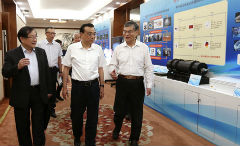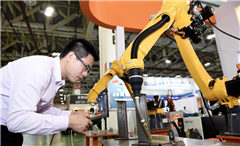AI startups win record 19.3 billion yuan in financing
2017-08-08
China Daily
China’s artificial intelligence-focused startups received record financing of 19.3 billion yuan ($2.87 billion) in the first half of 2017, with mid-and late-stage deals dominating across the period, according to a recent report.
The same report predicted that the industry is very likely to “enter an adjustment period” in the next half year.
According to a report conducted by itjuzi.com, a Chinese website dedicated to tech-investment data, the number of deals in AI-enabled startups in the country reached 96 in the first six months. Top verticals include healthcare, automobile, security, finance, logistics and warehousing.
The nationwide deal making spree echoed China’s ambitions for core AI industries. In July, the central government outlined a national plan aiming to grow the industry to 150 billion yuan by 2020, 400 billion yuan by 2025, and 1 trillion yuan by 2030.
Yang Lei, managing director of Northern Light Venture Capital, said the company has been paying close attention to AI startups with domain expertise at a basic level.
“Underlying technological innovations often provide high barriers of entry, and could compete with tech heavyweights,” Yang said. “In this sense, any breakthrough would count for much.”
Also, the venture firm, which oversees 10 billion yuan, is eyeing opportunities on the application layer.
“Self-driving technology is a trillion-dollar industry …In this category, startups adept interdisciplinary connection and vertical integration can stand out,” Yang said.
He cited Drive.ai, which is creating artificial intelligence software for autonomous vehicles using deep learning.
According to itjuzi.com, AI in intelligent robotics is the leading category for deals in 2017 so far, accounting for nearly one-third of total deals. Companies leveraging natural language processing, a subset of AI, received the most capital.
Part of the reason behind the forecast of an “adjustment period” lies in the imbalance in cash flows between the well-funded and early-stage companies, the report said, citing latest figures.
Almost 60 percent of the capital went to the top five companies in terms of funding. By contrast, only 21 percent flowed to AI-related startups in series-A round and earlier, which are still relatively nascent and account for 77 percent of total deals.
Some businesses in computer vision and image, cloud computing equipment, natural language processing and aided driving are poised for growth. Those focusing their efforts on sensor components, laser radar, and technological platform are still at early stage.
There are two bottlenecks, according to Yang Lei, that slow the commercialization of advanced AI technologies.
“The existing computer architecture, the theory behind the design of a computer, is not specially built for AI applications. The other one is the lack of talent (among people who are) knowledgeable about both technology and industry development,” Yang said.


